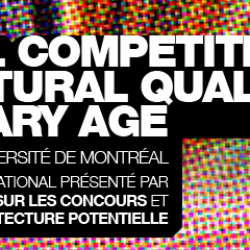
International Competitions and Architectural Quality in the Planetary Age. International symposium organised by the Research Chair on Competitions and Contemporary Practices in Architecture at Université de Montréal (16-17 March 2012)
Friday, March 16th, 2012 AM public conference with registration |
|||
| am | lecturer | institution | |
| 8:30 | Anne Cormier Opening Words |
Director, School of Architecture Université de Montréal www.arc.umontreal.ca |
Canada |
| 8:40 | Jean-Pierre Chupin Georges Adamczyk What Can We Learn About Contemporary Architecture Through Research on Competitions in the World |
Research Chair on Competitions and Contemporary Practices in Architecture (CRC) Université de Montréal www.crc.umontreal.caDirectors, Laboratoire d’Étude de l’Architecture Potentielle (LEAP) Université de Montréal www.leap.umontreal.ca |
Canada |
| Session 1 : Can International Competitions Tackle Local Issues? (Case Studies from Europe) Presidents: Jean-Pierre Chupin + Ian Chodikoff (report) |
|||
Ian Chodikoff Editeur en chef, Canadian Architect rapport de session
|
|||
| am | lecturer | institution | |
| 9:20 | Magnus Rönn Nordic Experiences of Architectural Competitions: From Prequalifications to Implementation of Winning Design Proposals |
Associate Professor School of Architecture and the Built Environment Royal Institute of Technology, KTH, Stockholm www.researchprojects.kth.se |
Sweden |
| 10:05 | break | ||
| 10:20 | David Vanderburgh and Carlo Menon Seeing Both the Finger and the Moon: Belgian Competitions in Their Representational Context |
Professor Université Catholique de Louvain Faculté d’architecture, d’ingénierie architecturale, d’urbanisme www.uclouvain.be Cellule architecture de la Fédération Wallonie-Bruxelles www.cfwb.be |
Belgium |
| 11:00 | Joris van Wesemael (and Jan Silberberger) We Have Never Been ‘Swiss’: Thoughts About Helvetic Competition Culture |
Professor University of Fribourg, Department of Geography Socio-spatial Complexity Lab www.geographiesofarchitecture.net |
Switzerland |
| 11:40 | Jean-Louis Violeau Nouveaux Albums des Jeunes Architectes and Europan: Advantages and Constraints of Two French ‘Trademarks’ |
Researcher and Professor AUSser UMR 3329 CNRS Laboratoire ACS, École Nationale Supérieure d’Architecture de Paris-Malaquais www.umrausser.cnrs.fr |
France |
| 12:30 | lunch | ||
| Friday, March 16th, 2012 PM public conference with registration |
|||
| Session 2 : Are Competitions True Vehicles for the Critical Debate on Architectural Quality in an International Landscape of Media? (Case Studies from Germany, USA, France and Canada) Presidents: Georges Adamczyk + Fabiano Sobreira (report) |
|||
Fabiano Sobreira Professeur, UNICEUB Universty Brasilia Architecte, Parlement brésilien Editeur, concursosdeprojeto.org rapport de session
|
|||
| pm | lecturer | institution | |
| 2:00 | G. Stanley Collyer Jr. Evaluating Competitions: Clients, Administration and Results |
Chief Editor Competitions Magazine www.competitions.org |
USA |
| 2:40 | Emmanuel Caille From Fascination to Promotion: Foreign Architects Invited to France |
Chief Editor La revue D’A (D’Architectures) www.darchitectures.com |
France |
| 3:20 | break | ||
| 3:35 | Thomas Hoffmann-Kuhnt The Architectural Competition as Driving Force to the German Building Culture |
Chief Editor Wettbewerbe Aktuell www.wettbewerbe-aktuell.de |
Germany |
| 4:15 | Ian Chodikoff Leveraging Design Competitions for Effective Urban Development |
Chief Editor Canadian Architect (Journal) www.canadianarchitect.com |
Canada |
| 5:00 | break | ||
| Friday, March 16th, 2012, 17:30 public event and lecture |
|||
| 5:30 | Keynote Speaker Shohei Shigematsu “Short List” |
Partner/Director OMA Office for Metropolitan Architecture, New York www.oma.com |
|
| followed by a discussion with Line Ouellet From the Competition to the Built Project: An Open Research Process with the Client |
Director Musée National des Beaux-Arts du Québec (Québec) www.mnba.qc.ca |
||
Saturday, March 17th, 2012 AM public conference with registration |
|||
| Young Scholar Sessions (Call for proposals directed by Joris van Wezemael and Jean-Pierre Chupin) How does the Internationalization of Design, Construction Services and Construction Markets Affect (the Appropriateness of) Competitions? How do the Local and the Global, the Economic and the Cultural, the Ecological and the Aesthetic Intertwine in Jury-Based Decision-Making? |
|||
| Session A President and Report: David Vanderburgh |
|||
David Vanderburgh Professeur, Université Catholique de Louvain / Faculté d’architecture, d’ingénierie architecturale, d’urbanisme rapport de session Comment l’internationalisation de la Conception, des Services de Construction et du Marché de la Construction change les concours (et leur pertinence)? Le point de vue apporté par cette session était plus riche que l’ensemble de ses majeures parties et a mené de façon intéressante au delà du sujet ostensible de la session. Un important thème sous-jacent qui a pris forme lors de la présentation et des discussions autour des quatre exposés était la question générale du bien-fondé du concours comme lieu de sélection et de jugement critique.
L’analyse longitudinale de Wilder Ferrer au sujet du concours PREVI sur des logements expérimentaux à Lima, au Pérou, a inauguré la session. La perspective historique de Ferrer est particulièrement intéressante, car elle démontre comment 1968, l’année du concours en question, est à la fois proche et très éloignée de notre situation actuelle. Dans des circonstances politiques très spécifiques, le Pérou a su attiré un large champ international de concurrents, et a décidé d’en profiter pleinement. Quarante ans plus tard, grâce à Ferrer et aux collègues de Post Occupancy Evaluations, on peut féliciter l’idéalisme de cet effort exemplaire mais aussi se questionner sur ce qu’il a engendré à long terme pour améliorer les conditions de logement sur le terrain. Ferrer a demandé à juste titre si la dimension internationale est nécessairement positive : elle affecte très certainement le jugement critique, et elle doit donc être contre-balancée par des énergies et expertises locales. L’excellent travail détaillé de Jonas Andersson sur les concours scandinaves dans le domaine des logements pour personnes-âgées a montré (du moins de façon implicite) que les concours n’assurent pas en eux-même l’évolution des pratiques culturelles et architecturales en la matière ; dans ce cas, ils ont servi à reproduire, même à renforcer, les inégalités nationales entre les pays scandinaves sur leur manière de traiter les personnes-âgées. Globalement fermés à une participation internationale, les concours qu’il a étudié ont surtout servi à perpétuer le contrôle des organismes nationaux de professionnels et des praticiens sur ce qui est considéré comme étant la «meilleure pratique». Dans le fascinant article de Carmela Curcuzzela sur l’utilisation de l’énergie comparative, il est devenu clair que les échelles de classement environnementales comme LEED sont avant tout connues pour être une sorte de raccourci pour quantifier les critères à la place de jugements plus profonds ou plus subtiles de la part des jurys et des membres officiels. Si les jugements critiques sont court-circuités – avec ou sans la complicité du jury – on peut alors se demander si les concours peuvent servir la cause commune du développement durable. De même, l’excellent article de Jan Silberberg au sujet de la curieusement baptisée «mention honorable» dans les concours Suisses, a souligné les difficultés juridiques et réglementaires causées par une sorte d’échappatoire légale autorisant les jurys à attribuer des projets à des équipes s’étant rendues elles-même inéligibles. Même quand tous les observateurs objectifs se mettent d’accord sur la meilleure solution, le règlement du concours peut parfois rendre sa sélection «illégale». Comment les organisateurs peuvent éviter de violer les droits des concourants tout en continuant d’exercer leur jugement critique avec le degré nécessaire de liberté intellectuelle, politique et professionnelle ? Les concours d’architecture attirent les architectes précisément en raison de leur impression d’équité – «que le meilleur projet gagne». Le travail pragmatique effectué par le jury pourrait dans plusieurs cas militer pour l’introduction de critères avant inconnus ou implicites (Ferrer, Andersson), pour la réduction ou l’appréciation des critères (Cucuzzella), ou pour l’assouplissement des règles (Silberberg). Dans de tels cas, où la limite doit-elle être dessinée, et comment pourrait être légitimée la décision du jury ? Le jury, dira-t-on, est toujours penchés sur ces questions. |
|||
| am | lecturer | institution | |
| 9:30 | Wilder Ferrer The PREVI 1968 International Competition on Experimental Housing Project in Lima, Peru: The Victory of Social Commitment |
Assistant Professor and Doctoral Student Federal University of Rio de Janeiro UFRJ (LABHAB) |
Brazil Peru |
| 10:05 | Jonas E. Andersson Architectural Competitions, Demographic Changes, and Eldercare as Parameters in the Creation of Space for Universal Ageing |
PhD, Assistant Professor School of Architecture and the Built Environment Royal Institute of Technology, KTH, Stockholm |
Sweden |
| 10:40 | break | ||
| 10:55 | Carmela Cucuzzella International Standards, National Norms and the Architectural Competition: A Problematic Shift of Conceptual Focus |
Adjunct Professor Concordia University, Faculty of Fine Arts, Montreal |
Canada |
| 11:30 | Jan Silberberger Are European Union Directives Threatening Swiss Architectural Competition Culture? |
Post-doc University of Fribourg and ETH Zürich |
Switzerland |
| 12:05 | lunch | ||
| Session B President and Report: Nicholas Roquet |
|||
Nicolas Roquet Professeur, École d’Architecture, Université de Montréal rapport de session
|
|||
| am | lecturer | institution | |
| 9:30 | Antigoni Katsakou Architectural Quality and the Iconic Status of Competition Proposals: A Study on Swiss Housing Competitions |
PhD (EPFL) Independent Scholar |
Switzerland |
| 10:05 | Camille Crossman On the Trajectories of Some Architectural Quality Criteria in Local and International Architectural Competitions |
Doctoral Student Université de Montréal (LEAP+CRC) |
Canada |
| 10:40 | break | ||
| 10:55 | Sofia Paisiou Merging the Local Concerns and Global Regulations in Construction Services: The Case of the Four Competitions for the New Acropolis Museum |
Post-doc University of Fribourg, Geography Unit |
Greece Switzerland |
| 11:30 | Bechara Helal On the So-Called “Experimental” Nature of Architectural Competitions |
PhD Candidate Université de Montréal (LEAP+CRC) |
Canada |
| 12:05 | lunch | ||
Saturday, March 17th, 2012 PM public conference with registration, followed by a private coordination seminar |
|||
| Session 3: Can Digital Archiving of Competitions Projects Enhance the Building of a Planetary Architectural Culture? Presidents: Thomas Kuhnt-Hoffmann + Denis Bilodeau (report) |
|||
Denis Bilodeau Professor Adjoint, École d’Architecture, Université de Montréal rapport de session
|
|||
| pm | lecturer | institution | |
| 1:30 | Ignaz Strebel Capturing Competition Data: How to Involve Stakeholders in Building a Database on Architectural Competitions |
Researcher ETH Zürich, Department of Architecktur, ETH Wohnforum www.wohnforum.arch.ethz.ch |
Switzerland |
| 2:10 | Fabiano Sobreira Design Competitions in Brazil: Building a Culture of Architectural Quality |
Professor UNICEUB Universty Brasilia Architect, Brazilian Parliament Editor, concursosdeprojeto.org www.concursosdeprojeto.org |
Brazil |
| 2:50 | Jean-Pierre Chupin On the Changing Nature of Architectural Knowledge in a Multipolar World |
Chief Editor Canadian Competitions Catalogue (CCC) www.ccc.umontreal.ca |
Canada |
| 3:30 | Georges Adamczyk + Jean-Pierre Chupin Announcement of the 2012 CRC/LEAP Prize for Exemplary Competition(selected by an international jury from the variety of cases presented by the speakers and on recommandation by a network of competition experts) |
||
|
The 2012 winner of the CRC/LEAP Prize for exemplary competition is: Further information and press release here.
|
|||
| 3:45 | break / end of public conference | ||
Saturday, March 17th, 2012 PM private coordination seminar |
|||
| pm | speaker | subject | |
| 4:00 | Session presidents | Critical Summary of the 5 Sessions | |
| 4:30 | All Moderated by Georges Adamczyk and Jean-Pierre Chupin |
Plenary Session Some Ideas for the Constitution of an International Network on Competitions |
|
| 6:00 | wrap up | ||


